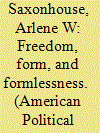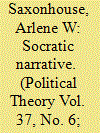| Srl | Item |
| 1 |
ID:
131500


|
|
|
|
|
| Publication |
2014.
|
| Summary/Abstract |
Liberalism begins with the free individual; the liberal state comes into being in order to preserve that freedom. Part of that freedom, to use the language of John Stuart Mill, is choosing one's own life plan, escaping the forms and lifestyles imposed on us by history or nature. Two texts from ancient Athens-Euripides' Bacchae and Plato's Republic-explore the challenge posed by what I call "the escape from form." The Bacchae, while capturing our longing for a freedom from form, portrays the devastation of a city invaded by just that freedom; the Republic, while capturing the epistemological and political need for form, portrays a frightening vision of a city so bound by form that it becomes immobile. Socrates' self-critique in his reconsideration of the artisan in Republic 10, however, unites the forms his Callipolis demands with the multiplicity of human identities that the god Dionysus brings to Thebes in Euripides' tragedy.
|
|
|
|
|
|
|
|
|
|
|
|
|
|
|
|
| 2 |
ID:
092139


|
|
|
|
|
| Publication |
2009.
|
| Summary/Abstract |
Plato wrote dialogues. While there has been attention to the dramatic elements of Plato's dialogues by a number of scholars, there has been much less attention to the narrative style of the dialogues. I argue that we should consider whether the dialogues are recited or presented like dramatic works with each character speaking his own words-or as a mixture of these narrative forms. By employing this interpretive tool to read the Republic, I illustrate how paying attention to the narrative style enables us to see a democratic Socrates who undermines readings of the Republic famously offered by Karl Popper and Leo Strauss. Plato appears then as neither a defender of the "closed society" nor an advocate of the elite rule of the wise over the many.
|
|
|
|
|
|
|
|
|
|
|
|
|
|
|
|